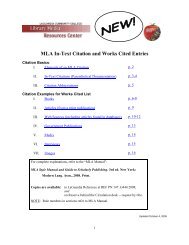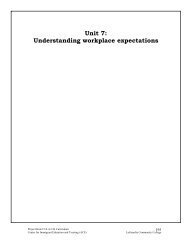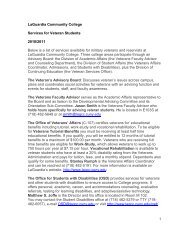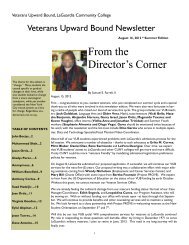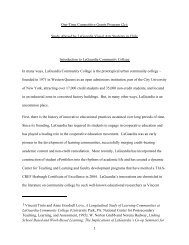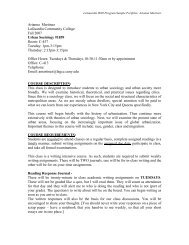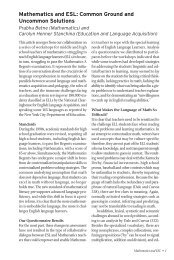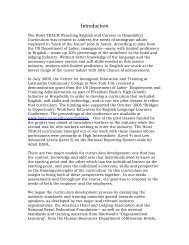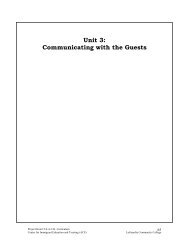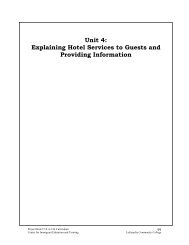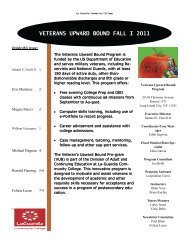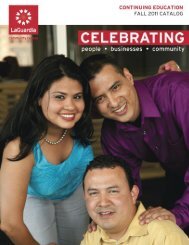COURSE INDEX - LaGuardia Community College
COURSE INDEX - LaGuardia Community College
COURSE INDEX - LaGuardia Community College
You also want an ePaper? Increase the reach of your titles
YUMPU automatically turns print PDFs into web optimized ePapers that Google loves.
Health Sciences Department<br />
ioral responses to stress will be explored as well as the determination<br />
of goals for intervention. Focusing on the use of self as a<br />
therapeutic agent, students will learn techniques of intervention<br />
to promote and maintain clients’ mental health, as well as assist<br />
clients who are mentally ill. Experiences will be provided in psychiatric/mental<br />
health settings.<br />
Prerequisites: MAT120, SCB204, SCR110, SCR150, SSY240<br />
Pre-corequisite: SCB260<br />
Corequisite: SCR210<br />
SCR210 Medical Surgical Nursing I<br />
5 credits; 9 hours (3 lecture, 3 lab, 3 clinical)<br />
This course will focus on nursing care of adults with major health<br />
problems. Utilizing the nursing process, students will develop<br />
appropriate plans of care for clients. Emphasis will be placed on<br />
formulating goals for interventions. Heavy emphasis is placed on<br />
pharmacology.<br />
Prerequisite: MAT120, SCB204, SCR110, SCR150, SSY240<br />
Pre-Corequisite: SCB260<br />
Corequisite: SCR200<br />
SCR260 Trends in Nursing<br />
1 credit; 1 hour (1 lecture; 1 small ePortfolio lab)<br />
The course provides students with the opportunity to critically<br />
examine contemporary issues and trends and their impact on the<br />
nursing profession. Legal, ethical, cultural, social and leadership<br />
concepts will be examined. The role of the associate degree nurse<br />
and the transition from student status to member of the profession<br />
will be explored. This course, as the capstone course of the<br />
Registered Nursing Program, contains an ePortfolio technological<br />
component.<br />
Prerequisite: ENG102, SCR150<br />
SCR270 Parent-Child Health Nursing<br />
8 credits; 14 hours (5 lecture, 3 lab, 6 clinical)<br />
This course focuses on the promotion of health and caring for<br />
childbearing families, their newborns, and children with major<br />
health problems from infancy to adolescence. Emphasis is placed<br />
on the implementation of nursing care plans. Experiential learning<br />
offers opportunities to provide care during the antepartal,<br />
intrapartal, and postpartal periods of the maternity cycle, as well<br />
as in the newborn and pediatric settings.<br />
Prerequisite: SCR200, SCR210, SCB260<br />
Pre- or Corequisite: ENG102<br />
SCR290 Medical Surgical Nursing II<br />
9 credits, 19 hours (4 lecture, 3 lab, 12 clinical)<br />
This course focuses on the care of adult clients whose ability to meet<br />
one or more health needs is severely compromised. Emphasis will<br />
be placed on the evaluation phase of the nursing process. Selected<br />
experiences will be provided in specialized acute care settings.<br />
Prerequisite: SCR270;<br />
Corequisite: SCR260<br />
Occupational Therapy<br />
SCO101 Introduction to Occupational Therapy<br />
3 credits; 7 hours (1 lecture, 6 lab)<br />
This course provides an overview of occupational therapy, its<br />
scope of practice and basic principles, and introduces some of the<br />
roles of the occupational therapy assistant. Course activities<br />
include analysis and instruction of games and small crafts, development<br />
of communication skills, practice of body mechanics and<br />
ergonomics and field visits. The effects of environmental and cultural<br />
differences in shaping activity behaviors and preferences are<br />
emphasized.<br />
Prerequisite: ENC/ENG101, SCB203, SCN195, SSY101, OTA000<br />
Corequisite: SCO110<br />
SCO110 Legal and Ethical Issues in Occupational Therapy<br />
2 credits; 2 hours<br />
This course addresses current legal and ethical considerations for<br />
the occupational therapy assistant. Topics range from history and<br />
philosophical base of occupational therapy to licensure and certification.<br />
Reimbursement issues, the occupational therapy code of<br />
ethics, ethical dispute resolution in professional settings, interdisciplinary<br />
roles with other professionals and advocacy for the profession<br />
and the consumer will be covered.<br />
Prerequisite: OTA000;<br />
Corequisite: SCO101<br />
SCO114 Documentation for Occupational Therapy<br />
2 credits; 2 hours<br />
This course provides students with background and skills to document<br />
occupational therapy services in a professional and accurate<br />
manner. The course will review ethical, legal, reimbursement<br />
and language issues, and will focus on skill development for note<br />
writing. Topics include: evaluation reports, goal writing, intervention<br />
plans, SOAP (subjective, objective, assessment plan) and DAP<br />
(data, assessment, plan) notes, discontinuation plans, educational<br />
plans and administrative reports.<br />
Prerequisite: SCO110;<br />
Pre- or Corequisite: ENG102, SCO214, SCO204, SCO284<br />
SCO175 Clinical Reasoning in Occupational Therapy<br />
2 credits; 2 hours<br />
Clinical reasoning is the process by which a therapist or therapy<br />
assistant analyzes the functional status of a patient/client/consumer,<br />
identifies problems and goals, and determines plans of<br />
action, as appropriate to each practitioner’s level of responsibility.<br />
Aspects of clinical reasoning and evidence-based practice are<br />
explored through readings and experiential assignments. Types of<br />
reasoning explored include: narrative, scientific, procedural, interactive,<br />
conditional and pragmatic.<br />
Prerequisite: SCO101, SCO110, SCO204, SCO114, ENG102<br />
Pre- or Corequisite: SCO205, SCO215, SCO285<br />
132



